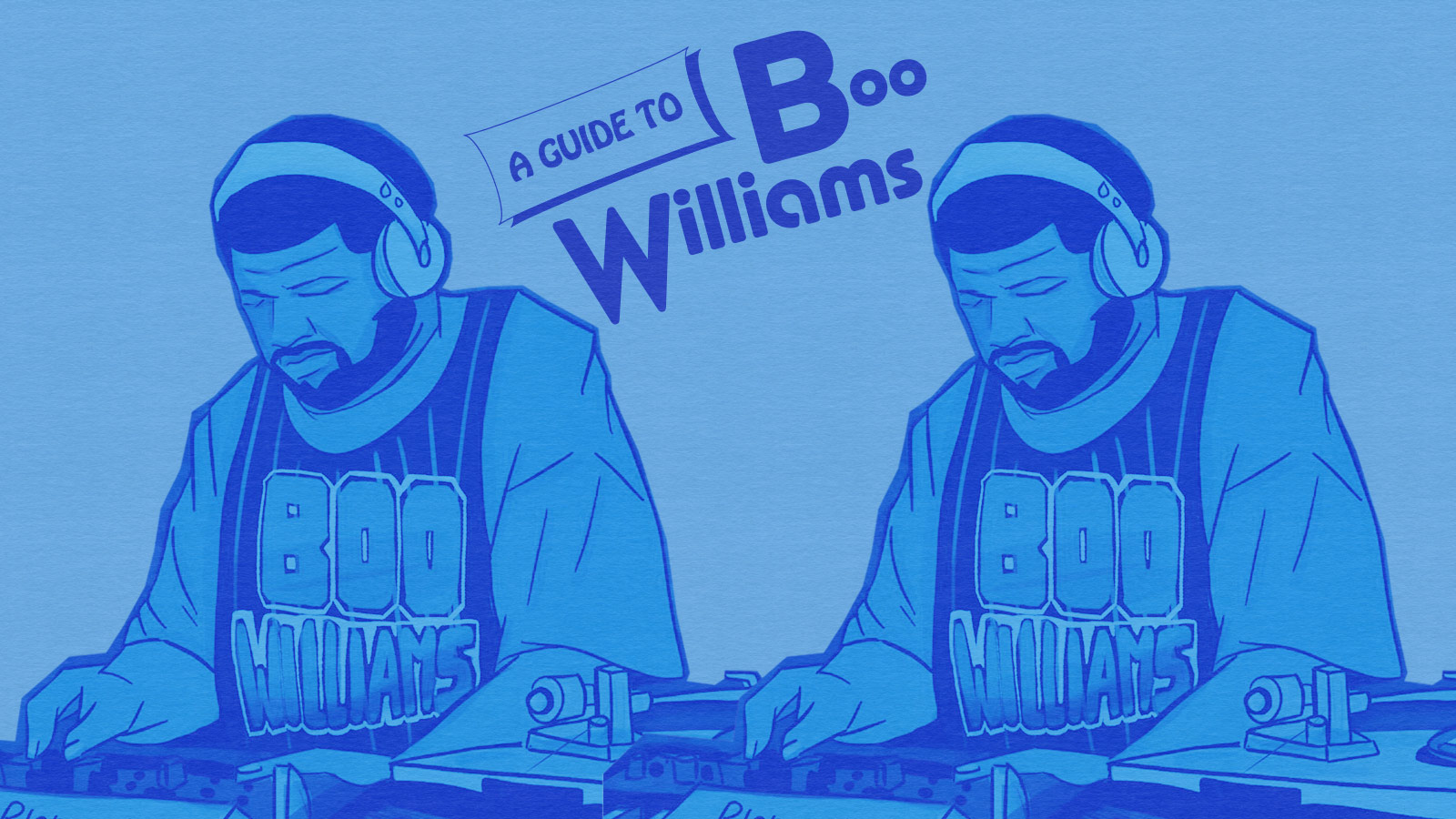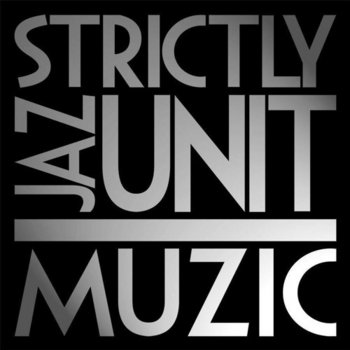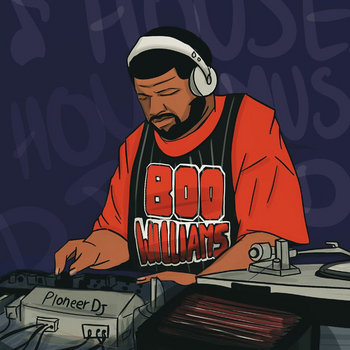
By the dawn of the early ‘90s, the locus of house music had begun to drift from its birthplace in Chicago out to New York City. When Godfather of House Frankie Knuckles, after moving back to the city, began a residency at Sound Factory Bar on West 27th Street, it felt symbolic of the changing landscape. “The only reason why I left to go back to New York in the first place is because I felt I had done everything that I could do here,” Knuckles told Terry Martin, editor of the Chicago house fanzine Crossfade, in 1993. “And I hate the fact that in Chicago, so many people are stuck in a time warp.” In reality, a younger generation of producers were picking up the baton to help lead Chicago house music forward, launching labels like Cajual Records, Relief Records, Guidance Recordings, and Prescription.
One of the most prolific yet largely unsung producers to emerge during this second wave was Boo Williams. Over three decades, the South Sider has moved effortlessly from peak-time house and driving techno to Ron Hardy–style disco edits. Along with releasing a raft of 12-inches under a range of pseudonyms, Williams was a founding member of The Strictly Jaz Unit with his friend and mentor Glenn Underground, with whom he still records.


Williams rose to prominence during the second wave of Chicago house, but his roots are firmly planted in the Windy City’s original house movement of the mid-’80s. While Frankie Knuckles laid the foundations at The Warehouse (whose devotees gave this new music its name), DJ Ron Hardy was perhaps even more important to house music’s gestation. It was at the Music Box’s second home at R2 Underground on 326 North Lower Michigan Avenue (underneath Lower Wacker Drive) that Hardy made his mark on future producers through his famously wild edits and raw mixes. Too young for The Warehouse, Boo Williams got his house music education at the Music Box, hearing Ron Hardy’s raw edits and the early house productions that would become future classics on labels like Trax and DJ International firsthand.
Many of those young, future Chicago house producers who handed untested tapes to Ron Hardy were also schooled at the parties of Lil Louis. The producer of famous tracks like “French Kiss” and “Video Clash” earned his legendary status at parties like Hotel Continental and Bismarck Pavilion. There, he spun for a younger crowd who played a vital part in house music’s rise.
It was as a clubber doing the circuit of Lil Louis parties that Williams met Glenn Crocker, aka Glenn Underground. Shortly after, Williams got his big break when he nabbed a DJ slot at the famous Power House. One night, Crocker handed him a tape of his music, which blew the roof off the club. Inspired, Williams began dropping into Glenn Underground’s home studio as often as he could to soak in the knowledge from his new mentor. He never looked back. And over the last three decades, Williams has been moving dancers with his genre-spanning productions, all done the Chicago way—raw, deep, and soulful.
Boo Williams
“Flashback”


Curtis Alan Jones established Relief in 1993 as a sublabel of Cajual to release the music he was recording under the name Green Velvet. Following releases from future Chicago icons DJ Sneak, Gemini, and Paul Johnson, Boo Williams released his first 12-inch on the label in 1994, the four-track EP A New Beginning. It was followed by an eight-track double 12-inch for Relief called Lost of Time. The raw techno house of “Flashback,” with a characteristic hard kick drum offset by abstract synths and a piano line reminiscent of Lil Louis’ “French Kiss,” was one of his first productions to reach European dance floors. It then appeared on Derrick Carter’s seminal compilation from 1996, The Many Shades of Cajual. You can now find it on The Best of Boo Williams from 2021.
Boo Williams
Home Town Chicago
1996 was a fertile year for Relief, with releases from the vanguard of house music’s second wave, like Gene Farris, DJ Sneak, and a stream of 12-inches from Green Velvet. This was the heady days of parties at clubs like Shelter, Red Dog, Foxy’s, and Smart Bar where Chicago’s second wave coalesced. A regular spinner at Smart Bar during this era—and every era since—Williams’s 1996 album Home Town Chicago came out in the period when many US clubbers raised on the rave scene began to look deeper to find the real roots of house. With his name reaching overseas, thanks to his connections to Relief, Boo created this love letter to his hometown. Covering everything from melodic techno to deep house to minimalism (all drenched in his trademark analog synth riffs) it’s a great entry point into the bruising yet beautiful dance music of Boo Williams.
Willie Snickers
“Dance Boogie 1997”
One of Boo Williams’s many aliases was Willie Snickers, a name he used for this EP on the short-lived Cajual subsidiary Daisy—also home to his EP Lucky Star Ship, recorded under the name Moon Man. This four-track EP revealed Boo’s love of disco, born out of his days in Chicago underground clubs like the Music Box. It was the kind of disco that was worked beyond recognition at the Music Box in the mid ‘80s by Ron Hardy, famed for his fierce mixing and deconstructed edits. Also well worth tracking down is Williams’s edits series Disco Runnerz from recent years, on his label of the same name.
Boo Williams
“Mortal Trance 1998”
Originally released on a three-track EP on Titonton Duvanté’s Ohio label Residual Recording back in 1997, “Mortal Trance” is possibly Boo Williams’s best-known track, thanks to a re-release by Rush Hour Records in 2010. Appearing on the Residual EP alongside other tracks Boo released on the label back in the late ‘90s (“Eternal Mind,” “Day and Night,” and “Techno Drone”), the Rush Hour release gave Boo Williams a new lease on life. Invites came in for gigs across Europe, including one at Fabric in London, for whom he discussed the making of the track in a rare interview: “One day, Glenn was working on a track with the Yamaha keyboard, and he made this sound that was amazing…I started playing around with what he created on the Yamaha, and I made ‘Mortal Trance’ in 15 minutes then saved it on a floppy disk. So when Glenn got back, he never knew I made it!”
Boo Williams
“Feeling Good”
The jazz-referencing deep house track “Feeling Good” was originally released in 2001 on his album Universal Limits for Mike Grant’s Detroit label Moods & Grooves. Home to productions by homegrown artists like Theo Parrish, Rick Wade, and Alton Miller, Moods & Grooves also released Boo Williams EP Virtual Limits under the name Moon Man. For an even jazzier side of Boo Williams, check another Moon Man track, “Cyber Trans,” recorded for the label Nite Life Collective in 2000. Both tracks can be found on The Best of Boo Williams, alongside early tracks for labels like Relief, Moods & Grooves, and Farris Wheel Recordings.
Boo Williams
“The Big Score”
Like his friend and mentor Glenn Underground, jazz, blues, and soul played a big part in Boo Williams’s musical upbringing thanks to his music loving family. And as with Crocker, he has never shied away from infusing these influences into his productions. From 2016 on Strictly Jaz Unit Extensions, a sub label of Glenn Underground’s Strictly Jaz Unit Muzic, “The Big Score” is jazz house at its very best with Williams on production, keyboards, and drums, and Steve Graeber providing the killer saxophone licks. Flip over for a Glenn Underground mix. And to get more of a flavor of Boo Williams’s jazz and disco side, search out his Fabric mix Strictly Jaz Unit Easy Days from 2013.
Willie Griffen
“Classic Fingers”
Alongside the DJ sets and edits of Ron Hardy, Boo Williams’s most formative influence was the deep house productions of Chicago elder Larry Heard, whose releases under the name Mr Fingers became the template of deep house. Released in 2001 as Willie Griffen (a tweak on his government alias) via Gene Farris’s prolific house label Farris Wheel Recordings, Classic Fingers took its name from Larry Heard’s foundation compilation from 1995. It was a fitting tribute to his hero, with the kind of jazzy keyboard licks and dreamy synth pads for which Mr Fingers is beloved. The On the Dancefloor EP featured Glenn Underground on Moog and Rhodes.
Boo Williams
“Outer Limits”
“Releases on the label will start at catalog number 100 and work backward until it’s time to start a new label,” announced the press release for his new label Boo Moonmnan in 2019. Emerging in December of that year, BMM100 was the single-sided EP Outer Limits. This was classic Boo Williams, with Acid bass lines, clashing snares, and those spacey analog keys of which he is a master. Originally released on a limited hand-stamped white label, it’s now available digitally on Bandcamp, alongside a selection of new releases, including a collaboration with spoken word artist Jamiel Patton and vocalist Kim Miller. Also, look out for a host of classic releases from original studio DATS spanning his multitude of monikers and label homes.







